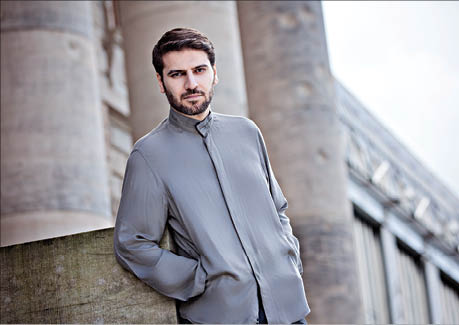Samy Yusuf is a British singer-songwriter of Azerbaijani origin and was in Delhi earlier this year for his India debut at the second edition of Sufi Route, a Sufi music festival. He is known for his unique brand of music that seamlessly blends mystical traditions like Sufi music from Turkey, mugham from Azerbaijan and qawwali from South East Asia. He gained instant popularity with the release of his first album, Al-Mu’allim, in 2003 and has launched eight albums since—the latest one being a six-song EP titled SAMi, in December 2018.
Days before his performance in Delhi, the 38-year-old singer spoke to Guardian 20 about his love for traditional instruments and the profundity of sacred music. Yusuf has termed his style of music as “spiritique”, and calls it is a mix of both traditional and contemporary music. He said, “At the contemporary level, it aims to create social cohesion, inclusion and incorporates sounds that are quite accessible. And it also includes traditional sacred music.”
The multi-instrumentalist is an expert at playing traditional instruments like the oud (a stringed instrument predominantly used in Western Asia and north Africa) and the tonbak (a goblet drum from Persia) among others. When asked how his interest in these instruments developed, Yusuf answered, “For me the instruments of the East have a particular essence, a soul, that is very difficult to put into words.”
His fascination with Eastern forms of music grew when he started to observe the etiquettes these musical forms inculcate in artistes. By contrast, Yusuf believes, Western musical forms are becoming devoid of values and customs that once informed them.
He said, “How to conduct yourself, how to sit and talk to your teacher are all part of the Sufi teachings, which is also called adab. Unfortunately, this is missing in the current forms of music, but traditional forms still have these etiquettes and this is why I am fascinated by traditional music. If you look at Western classical music, when the conductor arrives on stage everyone stands. It is a ceremony now, but in the olden days it used to mean something. The conductor had a sacred role. It is sad that these traditions in the West have only become ceremonial and symbolic. It has been preserved but the esoteric inner dimension has been lost to a larger degree. Thankfully, it still exists in the East.”
Yusuf comes from a family of musicians, which enabled him to make an early beginning in music. He said, “My dad is a composer, my cousins are musicians and then everyone at my home appreciates music… Until I was three or may be four years old, I couldn’t really talk, but I used to sing. My life has always been music. I don’t know what I would have done otherwise… Since my family members have been involved into making music professionally, I was exposed to the studio culture quite early in life. I used to help my father in the studio. So, at a very young age I got to understand the technical side of making music. Alongside, I was getting my music training and was also learning how to play traditional musical instruments.”
Though he was born in London, the musical influences he took in were distinctly Eastern. He was inspired by the Indian maestros like Pandit Ravi Shankar and Ustad Bismillah Khan, both of whom he had been listening to since his school days. Mugham, qawwali, Hindustani and Carnatic classical, Baroque and sacred Christian music have also had a huge influence on his music.
But what drew him to devotional music?
Yusuf said, “As with all sacred music, there is a soul in Sufi music and there is a touch of the divine. And it is not only in the Sufi music, you feel it in the Carnatic music, in the sacred music of Christians and in the Gregorian chant… There is something very palpable and evocative in sacred music. It touches you and connects you to a higher dimension. You are moved by its sounds and experience. You can’t help getting immersed in it and it will continue to have the same effect on people for generations to come, because it is perennial and ever-lasting. It is a sacred art and every tradition has it. Sufi music is particularly interesting because it has a global appeal.”
For Yusuf, the core of most Eastern and particularly Indian music forms is almost the same. While they differ outwardly in their history and origin, inwardly they both have “one divine centre”, he said.
He enjoys a huge international fan base but feels that he hasn’t yet been able to completely win over the Western audiences. “The Western audience is an interesting audience… However, very little attention is given to an artiste like me. The reason is that I don’t talk about getting a girlfriend, about drugs and alcohol… Also, I am a fully independent artiste. I have my own record company, I have my own label. So what happens is that people only support you there [in the West] when they have a vested interest. But I am not bothered about not being a part of that world which functions like a machine. I am honoured by the fact that the audience in Europe enjoys my music, but it is also true that I don’t try too hard for it,” he said.
About his upcoming projects, he said, “My record company and my audio-visual label service, called Andante Studio, keep me busy, because we have a lot of clients and we provide label services to help young and upcoming artistes… I have an album called Ecstasy coming up. It is out in September and it is a traditional Sufi album. I have a meditational album that I am working on, too. It will come out in 2020.”

